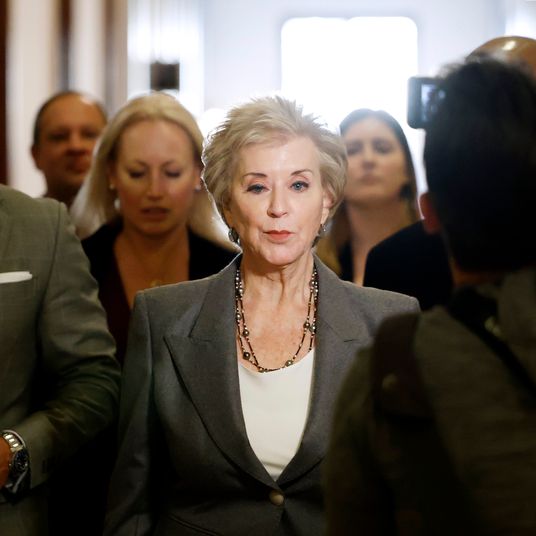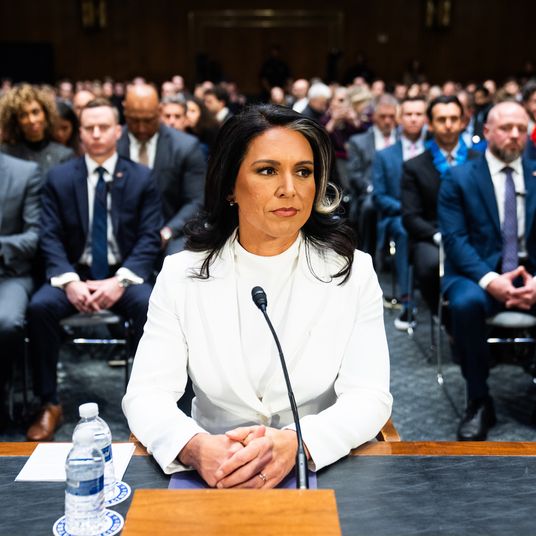
Back in that dreamy period for Republicans between November 8, 2016, and Donald Trump’s inauguration, when all things reactionary seemed possible, the consensus plan for dealing with Obamacare was called “repeal and delay.” It involved using the budget-reconciliation process to quickly repeal those elements of the Affordable Care Act that were not strictly regulatory in nature, but with delayed effective dates so that a full Obamacare “replacement” plan could be worked out at leisure, quite possibly with some Democratic support given the ticking time bomb of full repeal. This strategy had the great merit of letting congressional Republicans quickly “keep their promise” to bring down the great white whale of Obamacare, without immediately facing the consequences in terms of people losing insurance, or facing higher costs for skimpier coverage. And it also protected Republicans themselves from their own vast internal disagreements over the ultimate shape and structure of the health-care system.
But the agreement over “repeal and delay” quickly collapsed, with the key moment being a conversation between Trump and a U.S. senator on January 9:
Senator Rand Paul let the world know that he’d gotten a phone call from President-elect Donald Trump wherein the mogul expressed agreement with Paul’s argument that Obamacare should be repealed and replaced in a single action.
Other senators began expressing concerns about “repeal and delay,” and Trump delivered the coup de grâce in his first post-election press conference when he talked about an Obamacare-replacement bill being passed “most likely … on the same day or the same week — but probably the same day — could be the same hour” as repeal legislation.
Nearly a half-year later, with legislation to partially repeal and partially replace Obamacare teetering on the brink of failure in the Senate, the idea of a “repeal and delay” strategy is suddenly being promoted by — wait for it — Rand Paul and Donald Trump.
To be clear, Paul is not talking about the sort of very extended delays in consideration of a “replacement” bill (some thought until after the 2018 midterms) the original repeal-and-delay promoters contemplated. At one point he hints a bill extending the Children’s Health Insurance Program (CHIP), needed later this year, might be the appropriate vehicle.
What Paul’s 180-degree turn on “repeal and delay” signifies, though, is the realization of some conservatives that insisting on simultaneous repeal and replacement was a big strategic error. It encouraged Republican “moderates” to fight for retention of some key elements of Obamacare in the replacement bill and thus eroded support for anything like a full “repeal.”
With respect to Trump, though, it’s anyone’s guess what, if anything, his sudden support for two different actions on health care means. He could be reacting very immediately to the prospect of total failure on health care, which is what still another Republican senator was talking about in proposing a two-bill approach, as noted by Jonathan Cohn:
Trump’s tweet seemed to be endorsing an idea that Sen. Ben Sasse (R-Neb.) floated minutes earlier on Fox News and, according to the The Wall Street Journal, in a formal letter to the White House ― that if Senate leaders can’t assemble a majority by July 10, they should try a different strategy: Vote to repeal the bill outright, or at least strip its funding, and then spend a month in non-stop hearings and negotiations to hammer out a deal on a new coverage scheme.
In any event, the immediate reaction from Mitch McConnell’s circle was chilly, as Caitlin Owens reports:
Senate Republican aides quickly shot down President Trump’s tweet this morning, which said that if Senate Republicans can’t pass their current health care bill, they should repeal the Affordable Care Act first and then replace it later.
“Not going to happen,” said one senior GOP aide. “15 votes for that strategy. Which is why we are where we are.”
Bingo. The logic of “repeal and delay” is no better or worse than it was in January, when Trump and Paul successfully opposed it. Perhaps the worst sign for Republicans on health care is that they are now clearly going in circles.






























